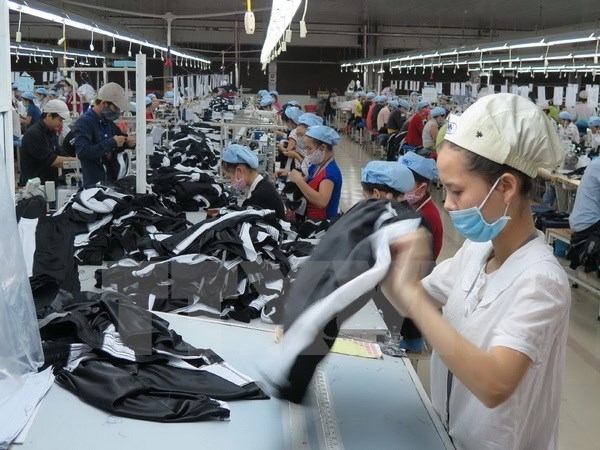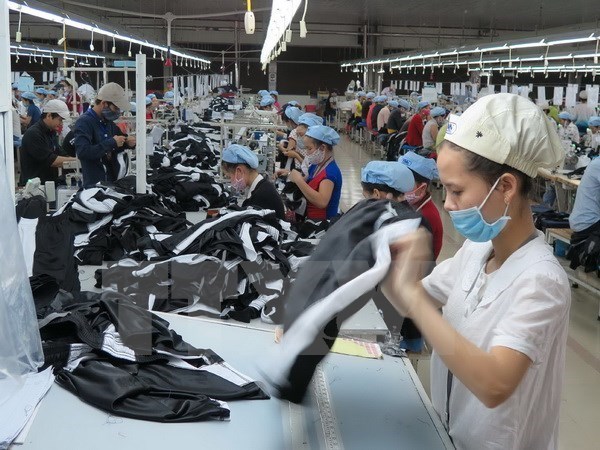
Vietnam has shipped footwear products to nearly 100 countries worldwide, with 72 of them buying at least 1 million USD of the products, reported the Vietnam Leather and Footwear Association (LEFASO).

Workers make cloths for export
at a factory in Vietnam (Photo: VNA)
Statistics from the General Department of Customs showed that the US remained
Vietnam’s largest footwear importer as of late May with 1.99 billion USD, up
13.9 percent year-on-year and accounting for 35.2 percent of Vietnam’s total
footwear export value.
The European Union (EU) ranked second with 1.76 billion USD, up 9.7 percent
annually and making up 31.15 percent of the total. It was followed by China
(418.4 million USD), Japan (284.4 million USD), the Republic of Korea (RoK)
(158.3 million USD). Those five markets accounted for 83.3 percent of Vietnam’s
earnings from footwear export.
The US also took the lead in buying Vietnam’s handbags, suitcases and
briefcases, spending in excess of 555 million USD, up 6 percent and making up
41.1 percent of Vietnam’s shipments of those products. Behind the US was the EU
(365 million USD), Japan (146.5 million USD), China (57.6 million USD), the RoK
(52.8 million USD). The five top markets accounted for 87.2 percent of the
total export value of handbags, suitcases and briefcases of Vietnam.
Nearly 80 percent of Vietnam’s leather product and footwear export value comes
from factories located in the south, the southeast and the southwest regions.
Ho Chi Minh City and the southern provinces of Binh Duong and Dong Nai are
currently the largest footwear and handbag producers.
In the north, most leather and footwear factories are concentrated in Thanh
Hoa, Hai Phong, Hai Duong, Hanoi, Ninh Binh and Thai Binh. In the central
region, only Da Nang city and Quang Nam province have some large-scale
production facilities.
In the first half of the year, the leather and footwear sector earned 8.7
billion USD from exports, marking a 11 percent increase, including 7 billion
USD from footwear and 1.65 billion USD from handbags and suitcases, up 12
percent and 4 percent, respectively.
It is forecast that the total earning this year will hit 17.8 billion USD, up
10 percent annually.
The LEFASO suggested that firms join manufacturing chains at home, in the
region and the world while adopting advanced technologies and exploiting
advantages offered by free trade agreements in which Vietnam is a member.
Source: VNA
According to data from the Hoa Binh Provincial Party Committee, the industrial production index for the first six months of 2025 is estimated to have increased by 20% compared to the same period last year. This marks the highest year-on-year growth rate for this period since 2020.
In the first six months of 2025, Hoa Binh province’s export turnover was estimated at 1.145 billion USD, marking an 18.11% increase compared to the same period in 2024. Import turnover was estimated at $ 804 million, a 17.15% increase, which helped the province maintain a positive trade balance.
The lives of the ethnic minority farmers in Tan Lac district have gradually improved thanks to the new directions in agricultural production. This is a testament to the collective strength fostered through the professional associations and groups implemented by various levels of the district’s Farmers’ Union.
With the motto the "product quality comes first,” after nearly one year of establishment and operation, Muong village’s Clean Food Agricultural and Commercial Cooperative, located in Cau Hamlet, Hung Son Commune (Kim Boi district), has launched reputable, high-quality agricultural products to the market that are well-received by consumers. The products such as Muong village’s pork sausage, salt-cured chicken, and salt-cured pork hocks have gradually carved out a place in the market and they are on the path to obtaining the OCOP certification.
In the past, the phrase "bumper harvest, rock-bottom prices" was a familiar refrain for Vietnamese farmers engaged in fragmented, small-scale agriculture. But today, a new spirit is emerging across rural areas of Hoa Binh province - one of collaboration, organisation, and collective economic models that provide a stable foundation for production.
Maintaining growing area codes and packing facility codes in accordance with regulations is a mandatory requirement for agricultural products to be eligible for export. Recently, the Department of Agriculture and Environment of Hoa Binh province has intensified technical supervision of designated farming areas and packing facilities to safeguard the "green passport" that enables its products to access international markets.



